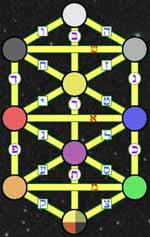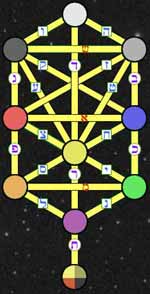












Paroketh is rather an odd part of the Tree. Sources don't agree on where it comes from, what its name means, what it represents, or even whether it's a veil at all. What's right? Can we even tell?
First things first: the word "paroketh" in Hebrew means "veil" or "curtain". Biblically it was specifically the curtain in front of the Most Holy Place in the Tabernacle. So from that perspective, we're safe: yes it's a veil ... at least there. But that covers only a fraction of what modern Qabalists are saying about it, so let's explore a little.
I have seen it said(PDF) of Paroketh that:
The Veil of Paroketh falls in the Path of Samekh between the two Sephiroth called Yesod and Tiphareth. The word Paroketh (PRKTh) refers to the four elements: Peh is Water, Resh is Air, Kaph is Fire, and Tau is Earth. It is the Word of the Veil of the Temple, before the Holy of Holies. It is the Veil of the Four Elements of the Body of Man.
According to Western Hermetic Qabalah, those elemental assignations seem wrong in nearly every particular. Peh equates to Mars, which emphatically is not water. Resh is the Sun ... fire, not air. Shin is fire, whereas Kaph is Jupiter, not very fire-like. Insofar as we treat Tau as the Center, we can accept it as Earth in some sense, but it's a stretch. ...But read on; we'll come back to this.
I've also seen an author claim that the name Paroketh
was likely chosen for its gematria: spelled as noted above,[1] פרכת sums to 700. However, this same author tells us that Paroketh isn't really a Veil at all, but instead a state or entity.
[2].
Yet another author says that Paroketh is named for the Hebrew letters that are placed in that part of the tree.
This also looks incorrect ... until we look at the Gra tree. Now we're getting somewhere! Peh, Resh, Kaph, and Tau are all double letters, which the Gra places as connecting Sephiroth along the Pillars. Sure enough, viewed that way, Peh, Resh, and Kaph do in fact cross between the two Triads in Yetzirah. And Tau does make a reasonable addition to that name, as it descends from Yesod to Malkuth.
Furthermore, if we use the Gra's layout we can draw lines below each of the mother letters to mark a Veil on the Tree as we currently know it. Including Paroketh as a Veil then makes perfect sense[3].
This also explains and justifies the assignation of letters to elements: they make sense when we understand that they aren't using the correspondences taught by Western Hermetic Qabalah. The three ancient Hebrew elements were air, water, and fire[4]. If we must find a fourth element, Tau would be earth, since it connects to Malkuth.
So there we have it. And it looks as though yes, Paroketh is a Veil, just as we'd like it to be. ...Whew!
That said, however, saying that It is the Word of the Veil of the Temple, before the Holy of Holies
is misleading in that it can make us think that to pierce that veil is to come face to face with the Divine. In fact, in some sense quite the opposite is true: Paroketh sits between Tiphareth and Yesod, and so is the barrier that separates our everyday consciousness from our subconscious. It is the veil that, going down, is the mirror of the Abyss that, going up, separates us from our super-conscious.
That's true when considering the parts of the Tree as they pertain to our Self as a Self. When working Qabalistic rituals up the Tree, however, it applies similarly. Piercing the Veil of Paroketh brings you to stand at the Sun before the Sun — Tiphareth as the light that presents itself to us to hide Kether. There remains another veil to be pierced before you can contact the Divine, and another yet before you may face the One.
The origin of the word Paroketh is obscure: it is not Biblical, nor modern Hebrew.. ...Well, nonsense: it is attested in Torah, as I already pointed out. The word פרכת does in fact mean
veil,
that which habitually shuts off. See for example Exodus 26:31 or 35:12.
souland
body, or
moralityand
nature.
The origin of the word Paroketh is obscure: it is not Biblical, nor modern Hebrew.. ...Well, nonsense: it is attested in Torah, as I already pointed out. The word פרכת does in fact mean
veil,
that which habitually shuts off. See for example Exodus 26:31 or 35:12.
souland
body, or
moralityand
nature.
[gra_tree] 
[ari_tree] 